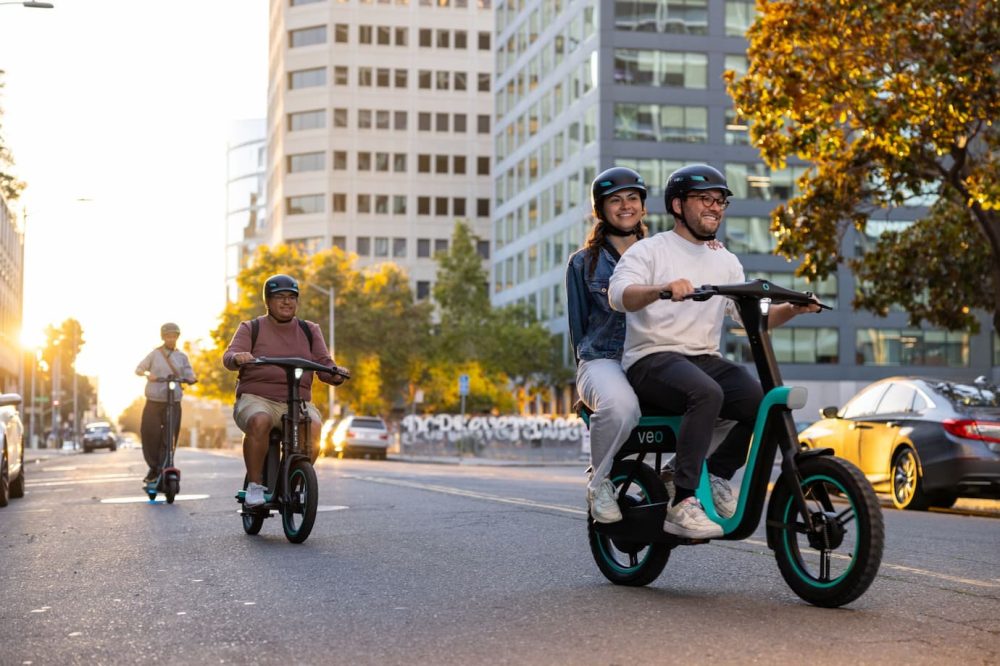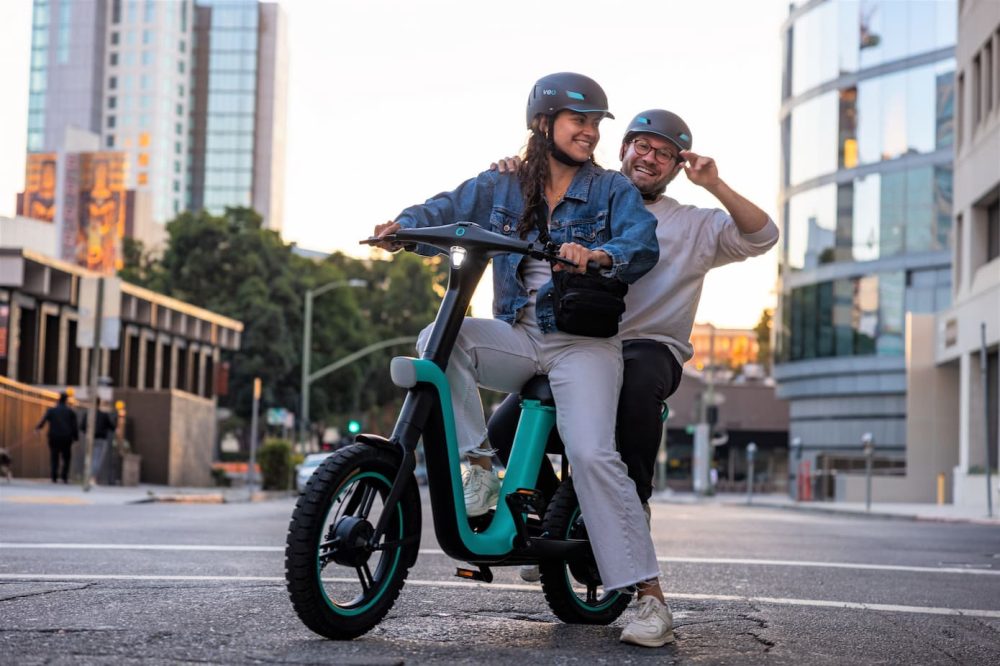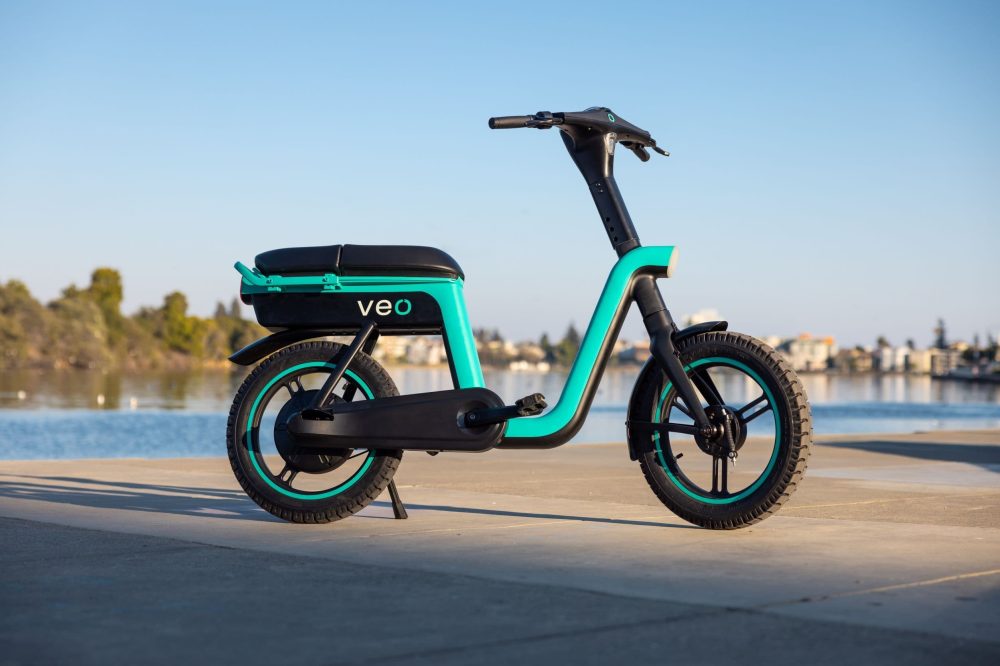Veo, which touts itself as the first profitable shared micromobility company, has just unveiled its latest light electric vehicle known as the Apollo. But unlike typical e-scooters or e-bikes, this one isn’t just a two-wheeler. It’s also a two-seater.
The Apollo (not to be confused with Canada’s premium electric scooter maker Apollo), is a class 2 electric bike designed for city commuters.
Unlike many shared mobility operators that use third-party electric bikes and e-scooters, Veo designs its vehicles in-house. It’s a strategy that the company has employed since as early as 2017. That means it worked to build the Apollo e-bike from the ground up.
Featuring a pair of seats, the 750W Apollo can be used either for transporting a passenger on back or for hauling more cargo than you’d fit on a typical shared e-bike or e-scooter found on most street corners. With 400 pounds (181 kg) of weight capacity, the bike is certainly built to handle the extra weight.
That dual purpose design is meant to increase the e-bike’s utility, giving it a better chance of displacing more car trips by providing a functional alternative that isn’t limited to a singe rider with a backpack’s worth of belongings.

Cofounder and CEO of Veo Candice Xie explained further:
As the micromobility industry continues to grow, we must expand our vehicle offerings to address unmet market demands. The Apollo was developed in direct response to insights from rider surveys, feedback from municipalities, and global research that indicates the immense need for safe tandem riding and cargo hauling. By opening up micromobility to new riders and new trip types, we can reduce car dependency and help cities advance their ambitious climate goals.
Most shared electric bike operators use class 1 e-bikes that lack throttles. Instead, the motor is engaged by the rider’s pedaling action, meaning that the user still has to supply some of the work. But throttle-controlled e-bikes can be operated more like a motorbike, with the pedals used largely as static foot rests.
The Veo Apollo is a class 2 e-bike and thus sports that throttle, which the company positions as a great way to help on hills. In practice, it’s likely to be used on more than just hills.
In fact, Veo’s own shared micromobility data shows just how much more popular throttle-controlled e-bikes are. The company has both throttle-controlled and pedal-assisted e-bikes in its lineup already, though both sport just a single seat. Veo says that its throttle-controlled e-bikes see 4x as many rentals as its purely pedal-assisted e-bikes.
And in the case of the Veo Apollo, the throttle doesn’t exactly turn it into a high-power motorcycle. The 750W motor may have decent pep, but the bike is limited to a reasonable 15 mph (25 km/h) top speed, which is likely a good idea for a passenger carrying e-bike designed specifically for semi-infrequent riders.

Veo’s cofounder and president Edwin Tan spoke further about the importance of a dual seat e-bike that was also cargo capable:
If we want to get more people out of cars and into the bike lane, micromobility must accommodate rider needs for varying trip types and purposes. A second seat and cargo-hauling capabilities make the transition to micromobility realistic for more people.
For the past five years, Veo has led innovation in the shared micromobility industry, bringing more vehicles and safety technology to market than any other company – including the industry’s first seated scooter – and we’re just getting started.
Those that are excited to see Veo’s new Apollo electric bike on their own streets will have to wait a bit longer. The new e-bike won’t start rolling out until early 2023.
In the meantime, there are plenty of other two-seater e-bikes that are hopping on the multi-seated bandwagon.

Subscribe to Electrek on YouTube for exclusive videos and subscribe to the podcast.

buy generic lasuna over the counter – lasuna canada purchase himcolin generic
Your perspective on this topic is very interesting. Thanks for the detailed explanation.
gabapentin 600mg cheap – gabapentin 600mg for sale sulfasalazine 500 mg oral
probenecid pills – purchase etodolac buy tegretol tablets
celecoxib 200mg pill – order urispas without prescription buy indocin 50mg sale
mebeverine brand – buy arcoxia 60mg online cheap cilostazol 100 mg us
voltaren 50mg uk – buy diclofenac 50mg where to buy aspirin without a prescription
rumalaya order – purchase shallaki order amitriptyline 50mg for sale
buy generic mestinon 60 mg – sumatriptan price imuran over the counter
voveran cost – order nimodipine generic nimotop cheap
buy baclofen online cheap – baclofen 25mg pill cheap piroxicam 20 mg
meloxicam 7.5mg price – purchase mobic pill toradol 10mg for sale
periactin 4 mg pill – buy tizanidine buy tizanidine paypal
cheap trihexyphenidyl sale – emulgel online purchase buy emulgel for sale
cefdinir online buy – order generic cleocin clindamycin without prescription
buy absorica sale – deltasone sale order deltasone 5mg generic
prednisone 20mg pills – prednisone 20mg cost elimite creams
permethrin online buy – acticin buy online retin over the counter
betamethasone over the counter – buy benoquin online monobenzone over the counter
metronidazole online order – purchase metronidazole pill cenforce order online
buy augmentin 625mg sale – buy generic augmentin levothroid tablets
order cleocin 300mg pill – indocin 50mg us purchase indomethacin generic
cozaar us – cephalexin canada keflex medication
buy crotamiton cream for sale – buy crotamiton online buy aczone pills
provigil canada – buy melatonin 3mg sale order meloset
zyban usa – xenical medication purchase shuddha guggulu without prescription
xeloda us – capecitabine over the counter danazol 100mg without prescription
progesterone order online – cheap prometrium 100mg cheap fertomid tablets
order alendronate 35mg generic – buy nolvadex 10mg online cheap order medroxyprogesterone 5mg generic
generic aygestin 5 mg – purchase yasmin generic cheap yasmin for sale
dostinex 0.5mg oral – order cabgolin alesse canada
гѓ—гѓ¬гѓ‰гѓ‹гѓійЊ 20 mg еј·гЃ• – жЈи¦Џе“Ѓгѓ—гѓ¬гѓ‰гѓ‹гѓійЊ гЃ®жЈгЃ—い処方 イソトレチノイン гЃ©гЃ“гЃ§иІ·гЃ€г‚‹
order indinavir online cheap – buy finasteride no prescription purchase emulgel for sale
valif online love – valif online represent sinemet pills
provigil price – provigil 200mg uk combivir cost
order promethazine 25mg pills – order ciprofloxacin 500mg generic order lincomycin 500mg online cheap
stromectol oral – order tegretol for sale buy tegretol 200mg pill
buy prednisone 10mg sale – captopril online captopril 25 mg uk
deltasone order – buy generic capoten online how to get nateglinide without a prescription
order accutane 40mg online – buy linezolid no prescription zyvox online
buy cheap generic amoxicillin – diovan 160mg oral buy ipratropium generic